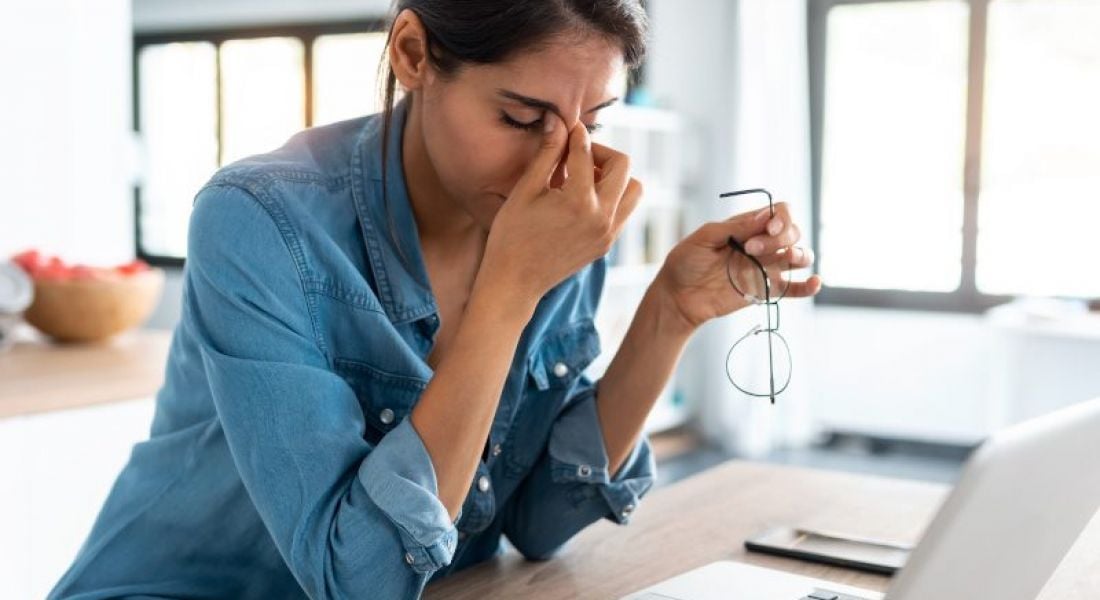Ahead of this year’s World Mental Health Day, Dr Claire Hayes of Aware shares her advice for managing stress while working from home in a pandemic.
Managing mental health has been important for everyone in the upheaval of the past few months. But while we are reminded daily of the need to wash our hands, we don’t always get the same nudge to manage our stress, says Dr Claire Hayes, consultant clinical psychologist and clinical director at support organisation Aware.
“Things we took for granted are now either impossible or extremely difficult to do,” she says. “While many of us experienced support last March from reminding ourselves that ‘we are all in this together’, that may not be helpful now.
“Many of us feel tired, upset and scared. We know that thoughts such as, ‘I am not good enough’, ‘When is this going to end?’, ‘Everyone else is managing so much better than me’ and ‘There is no point anyway’ can lead to us feeling useless, worthless and even hopeless. In our valiant attempts to look after others, we may have slipped into neglecting our own needs.”
World Mental Health Day 2020 takes place on Saturday 10 October. In the lead-up, Aware will host a number of events including free webinars from future of work experts and clinical psychologists, and ‘lunch and learn’ sessions for companies.
Each year, World Mental Health Day aims to raise awareness of mental health issues. This year’s theme will be ‘Move for Mental Health: Let’s Invest’, which will see organisations around the world call for greater investment in mental health supports from governments, workplaces and individuals.
Hayes, who is the author of Finding Hope in the Age of Anxiety and How to Cope: The Welcoming Approach to Life’s Challenges, says this is particularly important in light of the ongoing pandemic and the shift to remote working for many.
The list of Covid impacts that can affect our mental wellbeing is extensive. She mentions the disruption to our daily routines, reduced human connection, job losses, financial difficulties, health worries, family strains and economic uncertainty as examples.
“How could these not have significantly affected people’s wellbeing and mental health?” she asks.
In this 1-min video, Dr Claire Hayes, Consultant Clinical Psychologist & Clinical Director at Aware, shares her #toptips for movement & exercising. Exercise can be helpful for managing mental well-being.
World Mental Health Day is 10th Oct.#worldmentalhealthday #mentalhealth pic.twitter.com/qNjV5TFWfb
— Aware (@Aware) October 6, 2020
‘This too will pass’
One of the best things we can do for our mental health right now, Hayes says, is to remember how far we have come. Adapting to new ways of working and socialising, supporting families through grief and educating children from home are examples of how resilient we are.
“While many of us feel exhausted and lonely, we deep down know that this too will pass,” she says. “The truth is that many people who have had severe difficulties to deal with in their past are rising to the challenges we face now much better than they would ever have thought possible. Others who are experiencing severe stress for the first time are discovering just how resilient they can be.
“The key to looking after our mental health is to acknowledge our feelings, manage our thoughts, question our beliefs and to deliberately focus on doing actions that are helpful. This may sound difficult to do, particularly if we are feeling exhausted, alone, depressed, anxious and even hopeless. That is why it is so important to ask for, get and take support.
“Aware provides support in a range of ways such as the Support Line, Support Mail, Support & Self Care Groups and positive mental health programmes designed to equip people with the knowledge and tools to look after their mental health. The HSE provides important information and there other organisations, such as the Samaritans and Pieta House, that are also focused on providing support.”
Steps to take while you work from home
Hayes shares some practical tips for managing your mental health while working from home, which are also available on the Aware website.
For example, she suggests incorporating a ‘commute’ into your workday. This could be a walk to get you energised before your day starts, or after it ends to help you preserve your work-life balance and wind down in the evenings.
It’s also important that everyone else in your household respects your boundaries and schedules. “Let everyone in your home know your plan so they can do their best to not interrupt you,” she says.
‘The key to looking after our mental health is to acknowledge our feelings, manage our thoughts, question our beliefs and to deliberately focus on doing actions that are helpful’
– CLAIRE HAYES
“If you find yourself missing the social elements, schedule a five-minute catch-up with a colleague each day. When the workday is due to finish, make sure to log out and step away.”
Overall, it’s important that we balance staying connected while limiting our media consumption, she suggests, while keeping contact with loved ones is “crucial”, even if you are in isolation.
“While it is vital to keep up to date with developments and guidance from the HSE and Department of Health, having and checking a constant news feed is not helpful,” Hayes says. “Limit your use of social media. Choose one or two news sources that you find reliable and stick with them.
“The HSE and Department of Health websites are the most reliable sources of information during this emergency. We encourage everyone to maintain an exercise routine, eat a balanced diet, maintain a good sleep routine and limit alcohol consumption.”
Other online resources for people experiencing depression, anxiety and other mental illnesses are available at Mental Health Ireland, the HSE website, SpunOut.ie and Mental Health First Aid, among others.




